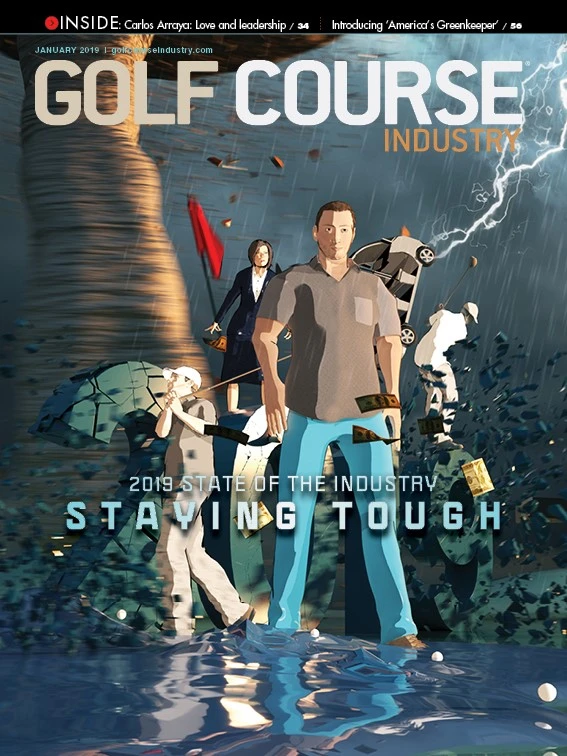
In my many years in this business, I’ve noticed that superintendents are hard workers: It must be something in our genetic makeup. But I’ve also noticed that we can also be hard on ourselves, certain that nothing is ever going to get done fast enough or good enough, or be completed on time and on budget.
As if that weren’t enough, for all the stress we put on ourselves, we work in a field that is famous for relying on two very unreliable and uncontrollable forces — people and the weather. Plus, we put ourselves out there every day by how we maintain our golf courses, leaving us open to criticism from many quarters.
Do you ever stop and think about what the job is doing to you? And by you I also mean your family, your friendships, and even your health? Are you putting so much pressure on yourself that you are harming these essential relationships?
If not, you should. Now. It’s time to prioritize your life.
Think about this: If you had only six months to live, how would you look at your life and the way you balance it with your work? I’m not saying to actually face such a grim reality, but I do recommend stepping back and taking a good, hard, long, honest look at what’s important to you and how you keep it all in harmony and perspective.
Far be it from me to look inside your head and advise you how to think. But I follow a simple thought that might work for you:
“No matter what happens, I am not going to get upset. I am not going to let outside influences get in the way of my happiness at work, with my family, or in my life.”
Yes, easier said than done, particularly with all the chatter from the outside world — members, golfers, even TV commentators — carping about your golf course conditions or the state of the golf industry. One stray comment can easily turn a good day at work into a crappy one.
Your objective is to not let that happen. Your goal, each and every day, should be to stay happy and not let negative comments and pressures of work take away from your enjoyment of life. You can’t control what others say, but you can control how you react to it.
Start by assessing your place in our industry. You can take great pride and satisfaction if the “right” people — peers, researchers, governing bodies — respect what you do. Even better if your members or golfers are happy with it, too.
When members chirp, remain calm. Losing control of a situation not only costs you happiness, but it also diminishes your power, both personally and professionally.
Stay happy, embrace being outdoors and doing what you love, and stay committed to your craft. As long as you can look forward to going to work, you should stay motivated. But when you lose the passion for what you do and it doesn’t feel so good, it may be time to reevaluate.
Keep home separate from work. But if you feel that it’s hard to disengage from work, don’t worry, you’re not alone. Many studies have shown that people have a difficult time making a break between their professional and personal time.
Technology has made this problem worse, because we’re never more than a click away. How can we do a better job of leaving work at work, and letting our home lives become more pleasurable and less stressful?
I’ve read a lot about how to make the break, and recommend the ideas of Dr. Deb Bright, who specializes in executive coaching. She offers tactics to put a true end to our workday so we can be truly “at home.” Among her suggestions:
Do one small task. Before leaving the office, make a short phone call, sign a document or respond to an email. This way you end your day on a positive note of completion. There’s gratification in knowing that you elected to push yourself and now have one less thing to do the following morning.
Write a to-do list. On paper or digitally, make a record of tasks to accomplish tomorrow, ideally in order of importance.
Straighten up your work area. Putting things away and organizing the piles will put you in better position to start fresh the next day.
Start the evening on a positive note. When you walk in the door at home, rather than greeting friends and family with the standard “How was your day?” – which invites thinking about work and may lead to unwanted discussions – ask instead, “What good or exciting things happened today?”
A final thought: Actions prove who you are; words are who they want you to be.
Life is short. Make the most of it, starting by taking better care of yourself.
Get curated news on YOUR industry.
Enter your email to receive our newsletters.
Explore the January 2019 Issue
Check out more from this issue and find your next story to read.
Latest from Golf Course Industry
- Carolinas GCSA raises nearly $300,000 for research
- Advanced Turf Solutions’ Scott Lund expands role
- South Carolina’s Tidewater Golf Club completes renovation project
- SePRO to host webinar on plant growth regulators
- Turfco introduces riding applicator
- From the publisher’s pen: The golf guilt trip
- Bob Farren lands Carolinas GCSA highest honor
- Architect Brian Curley breaks ground on new First Tee venue






